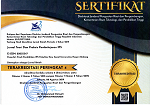Pengenalan tradisi Laras Madya dalam pembelajaran IPS melalui pendekatan konstruktivisme
Abstract
Social science learning is an effort to provide student’s knowledge and comprehension about social condition in daily life. Basicly, social science is an integration of the study of social science such as, history, geography, economics, politic, sociology and other humanities science. So, the main purpose of social science learning to create the humans who are aware of their position as members of civil society. The introduction of local tradition also needs to be included in gerenal material on social science learning. Students are able to know more about existence of local tradition, one of wich is Laras Madya tradition. Laras Madya tradition is a one of the local tradition that can be inserted into the general social science learning materials. The approach to introduce this tradition is constructivism. Constructivism is an effective approach to use because can provides sufficient space for student to actively seek, collect, and process information to build their knowledge. This article is the author’s conceptual idea wich aims to provide a new reference about local tradition.
Keywords
Full Text:
PDFReferences
Adzkia, S. F. (2016). Analisis Bentuk Musik atas Kesenian Laras Madya dan Resistensinya dalam Budaya Jawa. PROMUSIKA: Jurnal Pengkajian, Penyajian, Dan Penciptaan Musik, 4(1), 1–12.
Astawa, I. B. M. (2017). Pengantar Ilmu Sosial. Rajawali Press.
Bakri, S. (2015). Gerakan Komunisme Islam Surakarta 1914-1942 (Cetakan I). Penerbit & distribusi, LKiS Pelangi Aksara.
Bucchi, M. (2004). Science in Society: An Introduction to Social Studies of Science (1st English language ed). Routledge.
Carey, P. (2011). Kuasa Ramalan: Pangeran Diponegoro dan Akhir Tatanan Lama di Jawa, 1785-1855. Kepustakaan Populer Gramedia.
Ciptoprawiro, A. (1986). Filsafat Jawa. Balai Pustaka.
Endayani, S. H. (2018). Sejarah dan Konsep Pendidikan IPS. Jurnal Ittihad, 2(2), 117–126.
Geertz, C. (1973). The Interpretation Of Cultures. Basic Books.
Geertz, C. (1976). The Religion of Java. University of Chicago Press.
Hasan, S. H. (1996). Pendidikan Ilmu Sosial. Dirjendikti, Depdikbud RI.
Hauser, A. (1982). The Sociology of Art. The University of Chicago Press.
Houben, V. J. H. (2002). Keraton dan Kompeni: Surakarta dan Yogyakarta 1830-1870. Bentang Budaya.
Kymlicka, W. (1995). Multicultural Citizenship: A Liberal Theory of Minority Rights. Clarendon Press ; Oxford University Press.
Mu’ammar, M. A. (2019). Nalar Kritis Pendidikan. IRCiSoD.
Nasution, T., & Lubis, M. A. (2018). Konsep Dasar IPS. Samudra Biru.
Panggiyo. (2004). Seni Larasmadya Desa Wonorejo Kabupaten Sukoharjo. Keteg, 4(1), 41–53.
Ricklefs, M. C. (2007). Sejarah Indonesia Modern. Serambi Ilmu.
Schiering, M. S., Bogner, D., & Buli-Holmberg, J. (2011). Teaching and Learning: A Model for Academic and Social Cognition. Rowman & Littlefield Education.
Sumantri, M. N. (2001). Menggagas Pembaharuan Pendidikan IPS. PT Remaja Rosdakarya.
Sumarsam. (1992). Historical Context and Theories Javanese Music. Cornell University.
Waesberghe, F. H. S. (2016). Estetika Musik. Thafa Media.
Woolfolk, A. (2004). Educational Psychology. Pearson.
Zed, M. (2004). Metode Peneletian Kepustakaan. Yayasan Obor Indonesia.
Refbacks
Editorial and Administration Office:
This Journal is published by Prodi Pendidikan IPS, Fakultas Ilmu Sosial, Universitas Negeri Malang
Semarang St. No. 5 Building I3-102 65145.
Phone. (0341) 551312. line. 376 (19)
Homepage: http://journal2.um.ac.id/index.php/jtppips/index
email: jtp2ips.journal@um.ac.id
JTP2IPS INDEXED BY:
e-ISSN 2503-5347
ISSN 2503-1201
JTP2IPS is licensed by CC BY 4.0.











